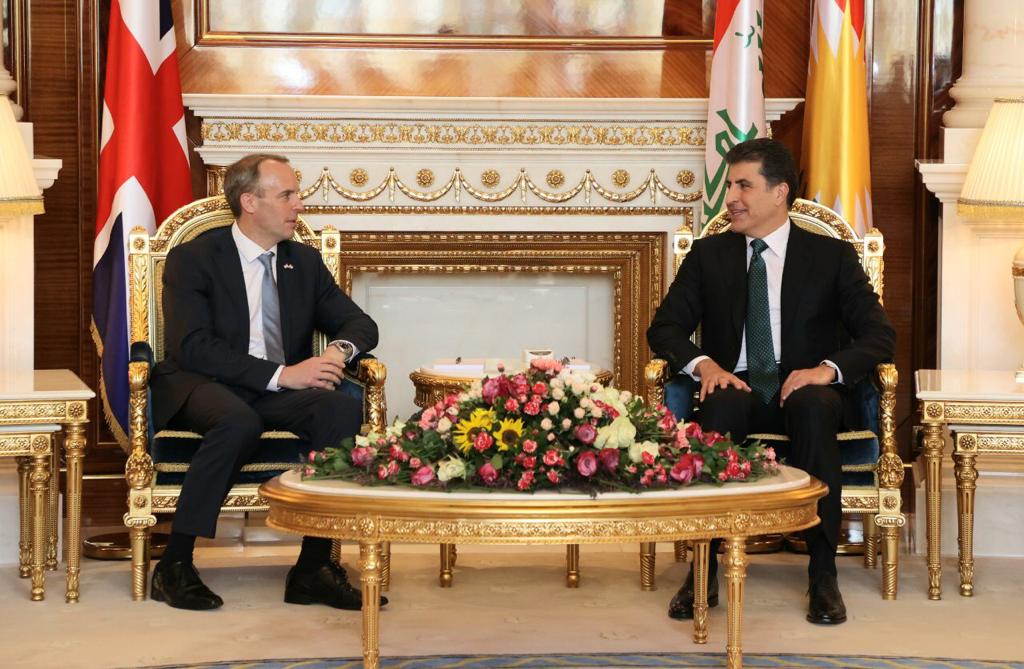
2021-06-09T18:38:47.000000Z
Erbil, Kurdistan Region, June 9, 2021
Kurdistan Region President Nechirvan Barzani received Mr. Dominic Raab, the United Kingdom’s Foreign Secretary and his accompanying delegation, in Erbil on Wednesday.
At the meeting, attended by the Kurdistan Region Vice Presidents, Kurdistan Region Deputy Prime Minister, the UK Ambassador to Iraq and the UK Consul General in Erbil, the strengthening of Iraq and the Kurdistan Region’s relations with the United Kingdom, job and investment opportunities for UK businesses in the Kurdistan Region, the reform process and the unification efforts at the Ministry of Peshmerga with the support from the United Kingdom were highlighted.
Discussions also covered the dangers of terrorism, especially the resurgence of ISIS, Iraq’s upcoming elections, Baghdad-Erbil relations, and the latest developments in Iraq and the greater region, and other topics of mutual interest.
Foreign Secretary Raab reaffirmed that the United Kingdom attaches great importance to its relations with the Kurdistan Region and is willing to further strengthen mutual relations, partnership and cooperation between the two sides. The Foreign Secretary officially invited President Nechirvan Barzani to the United Kingdom.
The President reiterated the importance of the continuation and expansion of areas of mutual partnership and cooperation between the two sides and referred to the historic relations between the Kurdistan Region and the United Kingdom. The President expressed his gratitude for the UK’s longstanding friendship and support to the Kurdistan Region.
Following the meeting, the President and the Foreign Secretary held a press conference on the content of their meeting. President Nechirvan Barzani started the press conference:
“Welcome all,
We welcome His Excellency the United Kingdom’s Foreign Secretary and his accompanying delegation, and we are delighted to welcome them to Kurdistan at this time within the framework of their visit to Iraq. In our meeting, we discussed a set of issues, including: the development of relations between the Kurdistan Region and Iraq with the Great Britain, the disputes between Erbil and Baghdad and efforts to resolve them, the war against terrorism, the dangers of the resurgence of ISIS, the upcoming Iraqi elections, the situation in the region in general and other issues of mutual interest.
“We value our relations with Great Britain highly, and we thank the UK for their continuing support to the people of Kurdistan. The partnership of the people of Kurdistan with Britain began 30 years ago in the mountains of Kurdistan. In April 1991, Britain worked with other countries in the United Nations Security Council to pass the Resolution 688, as Britain, along with our other partners, had a major role in mobilizing international support to establish the safe haven and the no-fly zone.
“The Resolution 688 and the process of providing a safe haven were the starting point for a new beginning for the Kurdistan Region, so that it could develop friendly relations at the international level. Since then, our relations with Britain have continued at various stages, and during the ISIS war, our partnership and cooperation expanded.
“We thank Britain and other members of the Global Coalition against ISIS for their continued assistance and support to Iraq and the Kurdistan Region. Together with Britain and the rest of the coalition, we affirm our commitment to continue to fight terrorism and the dangers and threats of ISIS.
“Like all countries around the world, the Kurdistan Region and Iraq have suffered great damage due to the Covid-19 pandemic and its repercussions. The economic recovery in the world in the post-Corona era needs planning, cooperation, partnership and multifaceted action.
“We are pleased that the G7 countries have allocated $15 billion to support women's development in developing countries, and we hope that Iraq and Kurdistan will benefit from this program. Especially in the fields of education, work, commercial projects, securing continuous income and solving the problems that resulted from the negative impacts of the Corona outbreak.
“The United Nations studies indicate that Iraq is one of the five countries most affected by climate change, and the beginnings of these detrimental effects have appeared in the Kurdistan Region, as drought is almost turning into a serious problem facing the Kurdistan Region. In addition to this, the negative impacts of the war against terrorism in Iraq and the Kurdistan Region had a harmful effect on the environment.
“We in the Kurdistan Region are committed to international measures to adapt, and mitigate the negative effects of climate change in the world. Within the framework of the limited capabilities of the Kurdistan Region, we have taken some small steps to formulate an ongoing plan to reduce the spread of CO2 and other gases that cause global warming. We are trying to apply practical measures in this area. We in Iraq and the Kurdistan Region need international assistance in this context.
“My heartfelt thanks to the British Ambassadors in Baghdad and the Consul General in Erbil for their efforts to strengthen our relations, we appreciate their efforts and wish them success.
“On behalf of the Kurdistan Regional Government and the people of Kurdistan, I welcome His Excellency the Minister. You are welcome.
Thank you.”
Later, Foreign Secretary Raab addressed the press conference.
“Mr. President, it’s an enormous pleasure to be with you today. Thank you for your warm welcome and the generosity of your hospitality. And I think it’s fair to say that my visit here reflects the importance that the United Kingdom attaches to this historic friendship. Let me say on a personal level, we are very proud to be long-standing friends of the Kurdistan Region of Iraq. The way you described, it’s now been over 30 years since the creation of the No Fly Zone on initiative of Prime Minister Sir John Major. I know there’s a road named after him, I’m gonna go take a selfie there at some point. And of course that was so vital to protect this region from Saddam Hussein and the violence that he inflicted on the people. I think it’s fair to say you have come an enormous long way since then. It’s been a challenging journey but you have come a long way. And the KRI has become, I would say, an enduring beacon of stability, resisting Iran’s destabilizing influence and you have been absolutely fundamental in the battle against Daesh. And we value that greatly and pay tribute to your efforts. And I think we have to pay tribute to the sacrifice of the Kurdish people, because there’ve been many of the victims along this historic journey.
“I had an excellent discussion with the President on a whole wide range of issues. We have shared interest, we have shared values. We got a joint stake in the stability of not only Iraq but the region. And UK is very committed to deepening that partnership on trade on business investments in all the areas that the President described.
“I think it’s positive that the Peshmerga reform con go forward, working with the Iraqi security forces and that can help remove Daesh from the disputed territories. I’m pleased that the UK provide new funding to train the Peshmerga on Cultural Property Protection, in line with the Haag Convention. And of course this in addition to the support that we are already providing.
“The President and I also discussed a whole range of other issues we attach importance to, the freedoms, security and guarantees for the people of the KRI, in particular things like media freedom, freedom of expression. I welcome the government’s focus on these things. I also welcome the KRI’s tolerant approach to people of all faiths and its support for displaced people. That’s enormously important. So, it’s partnership for the long term.
“The President’s touched on some of the international issues which are important for the UK and our G7 presidency. We touched upon the interests of the President and the KRI, he talked about girls education and climate change. We’re hosting the global partnership of education in July with our Kenyan friends, promote girls education globally. And of course he’s right about the importance of the issue in the KRI and Iraq generally. Climate change is another area for international cooperation. We’re hosting COP 26 in November. So it’s important to discuss the initiatives that are taking place here. And of course we can discuss all of these things more when the President visits the UK later on this year. So we look forward to see you in London and to strengthening even further this friendship between our government and even more importantly between our people.
Thank you very much.
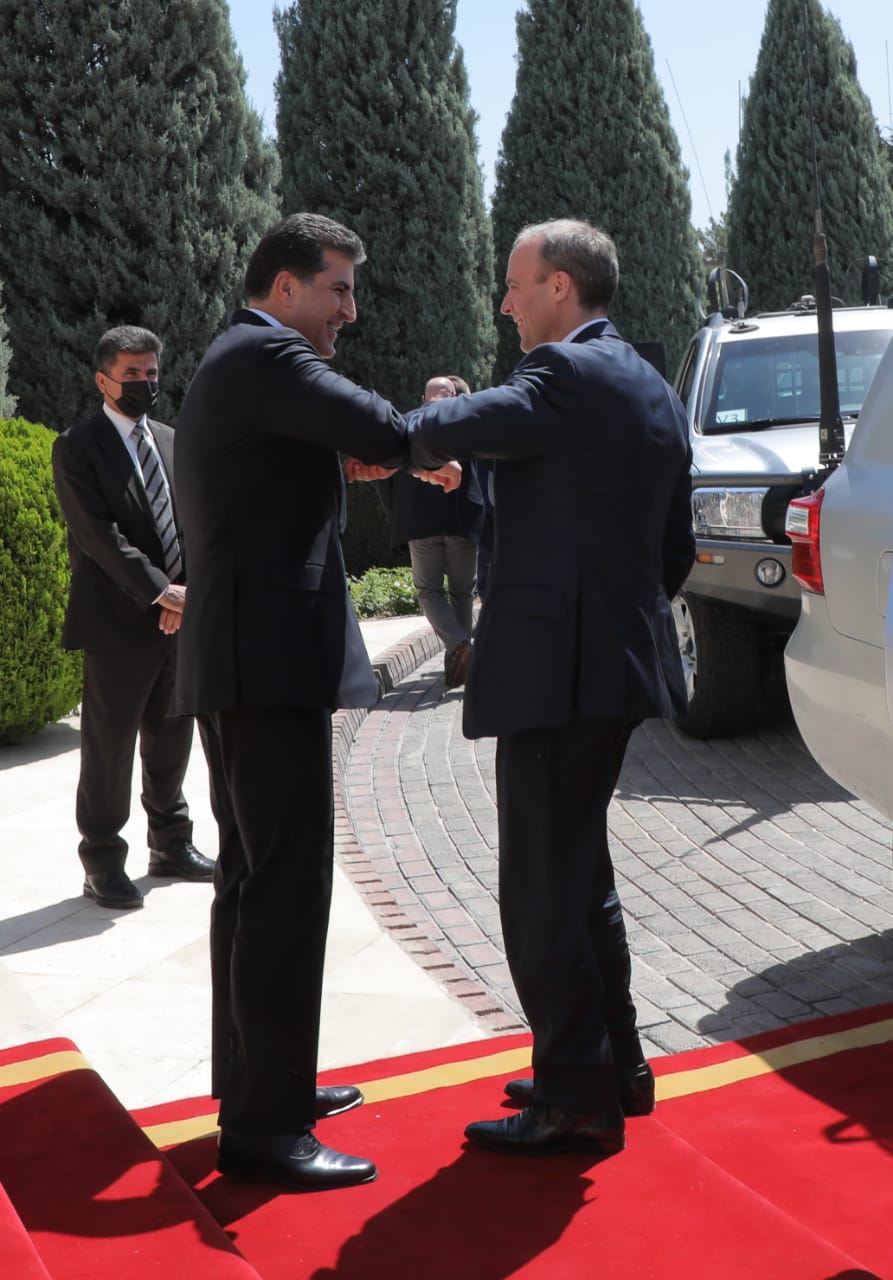


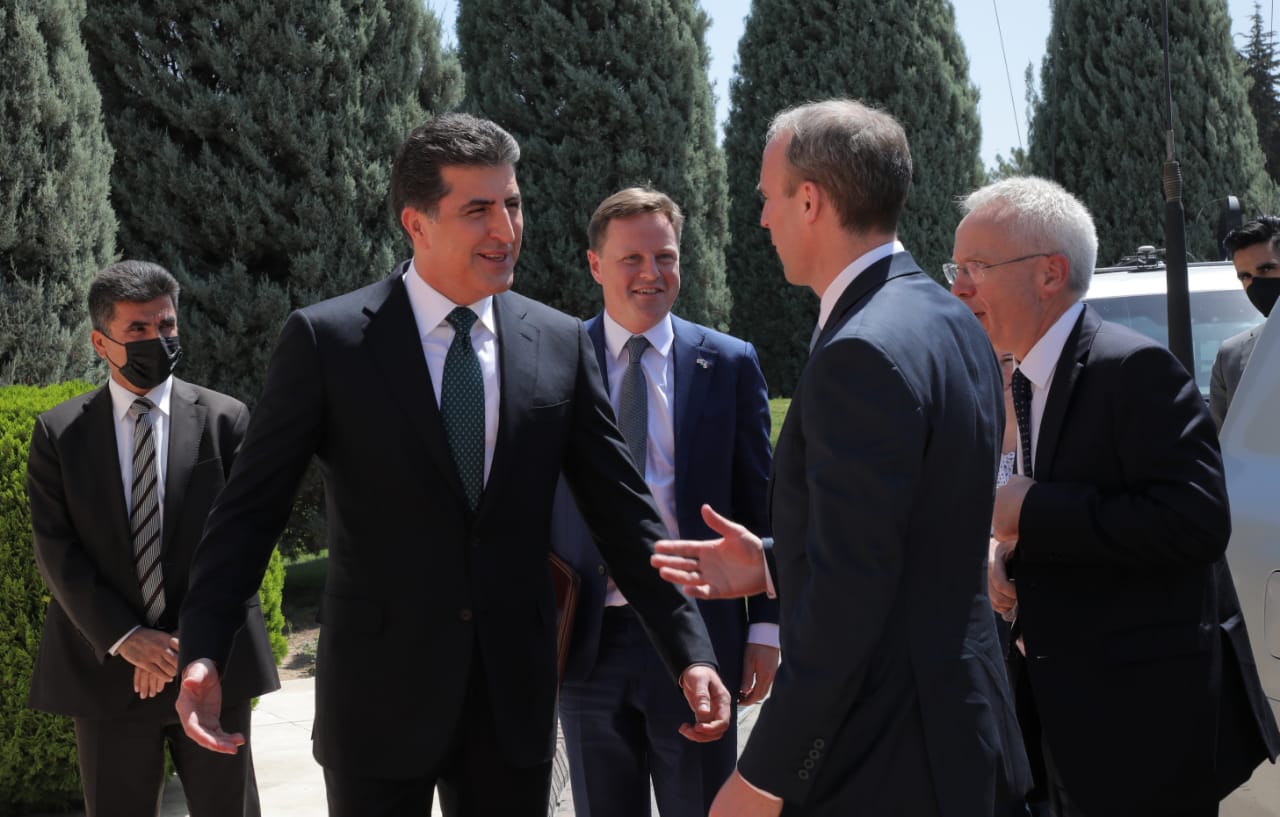
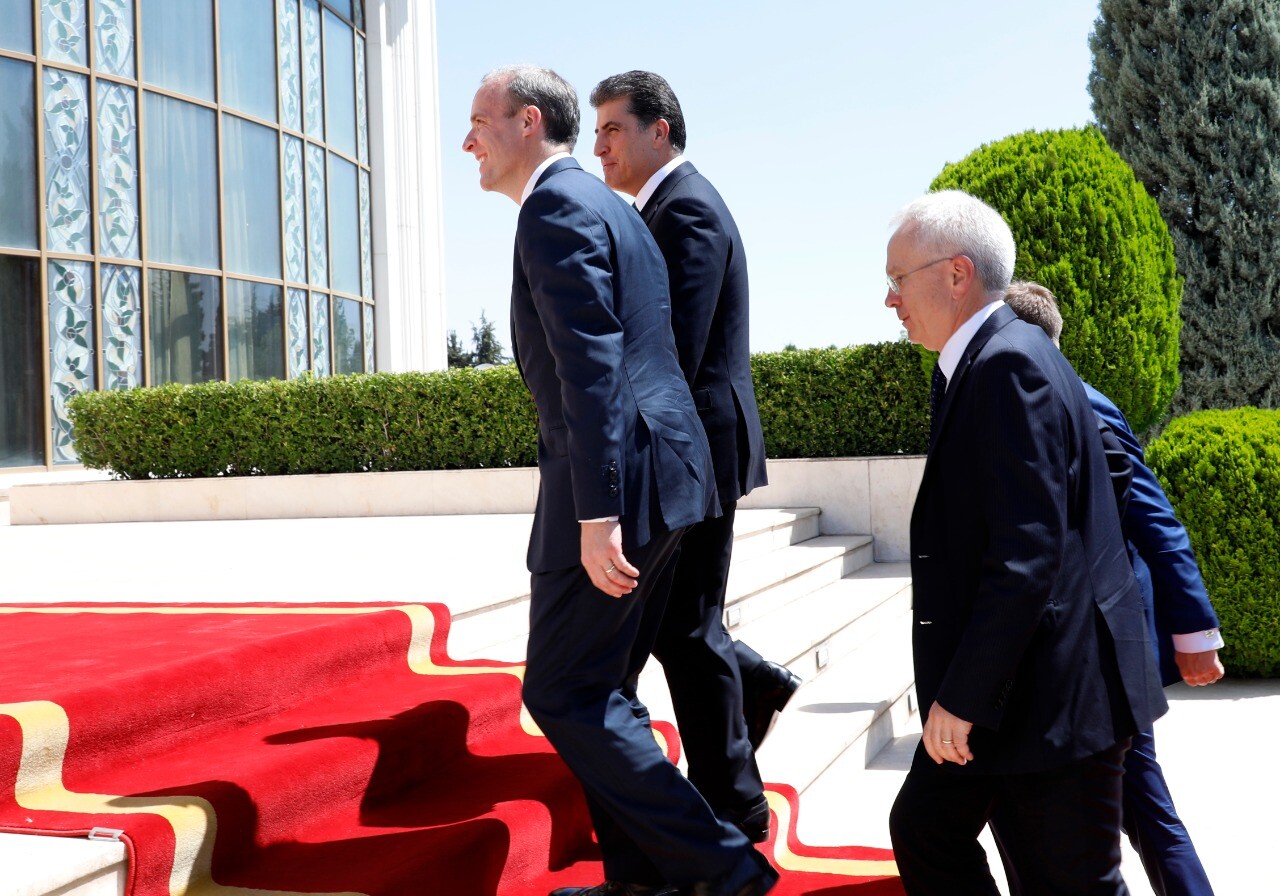
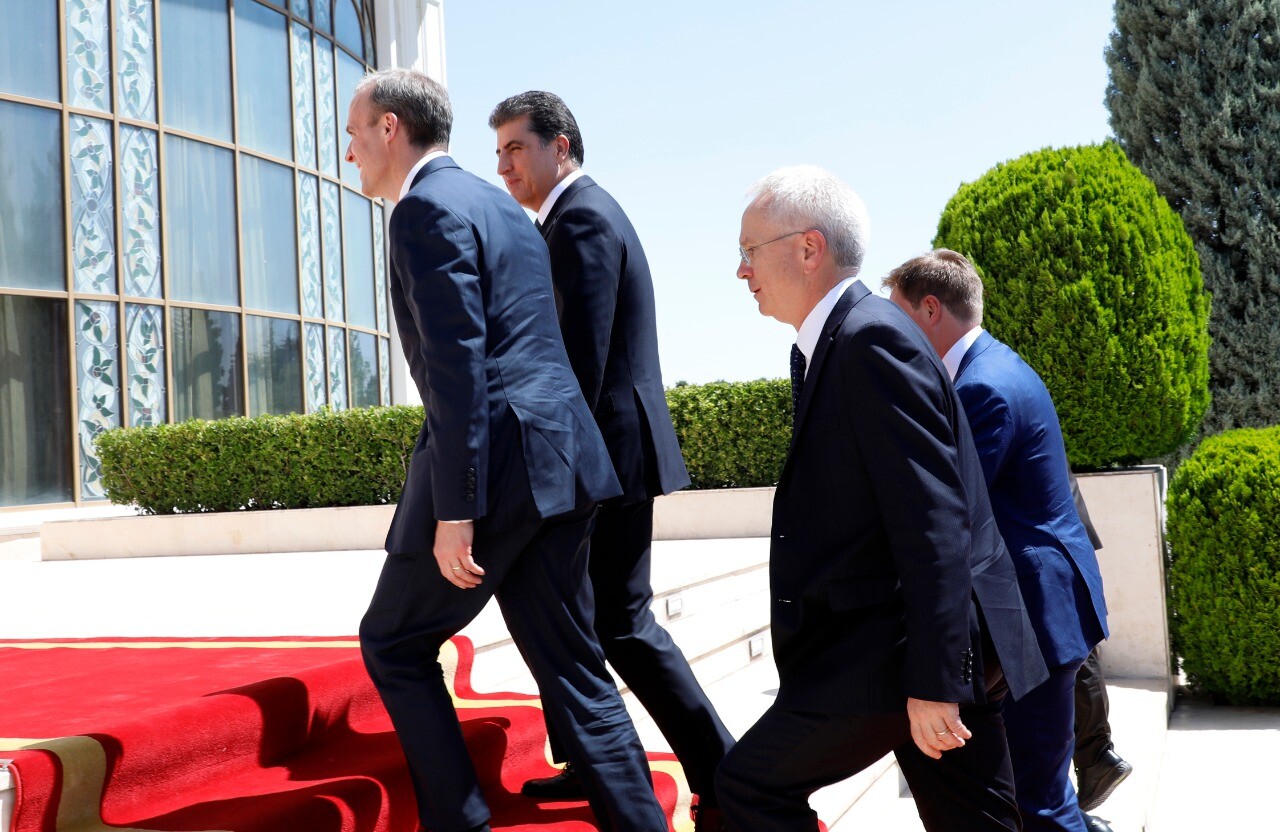
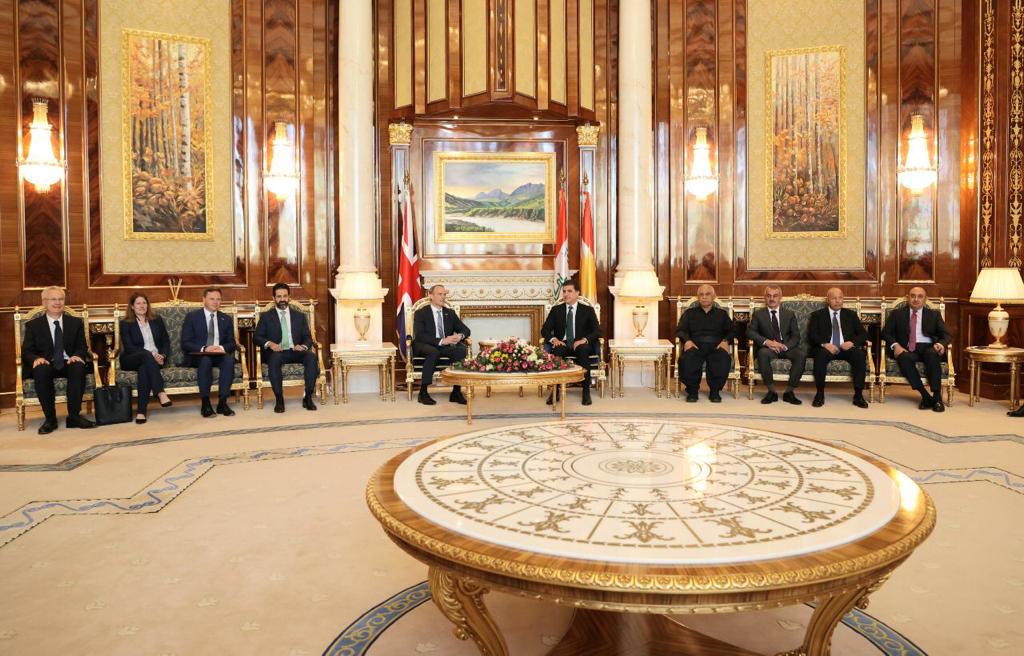
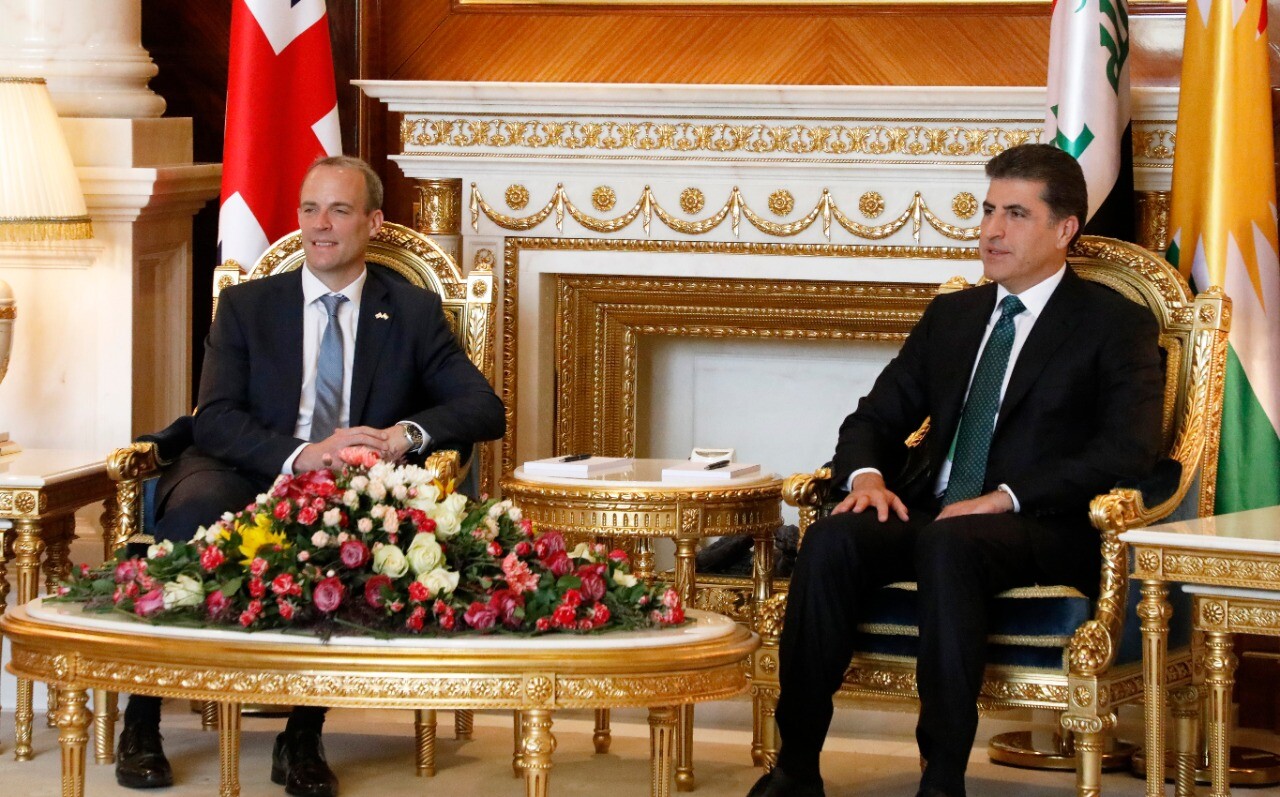

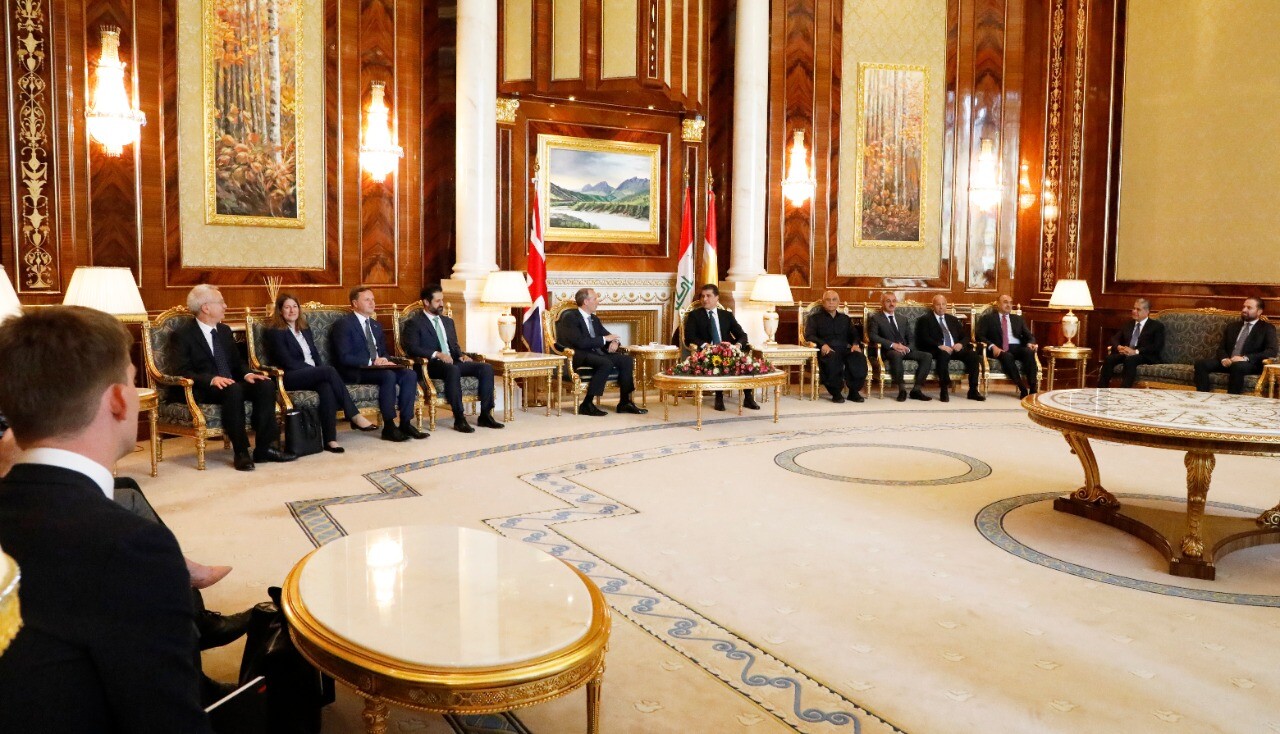

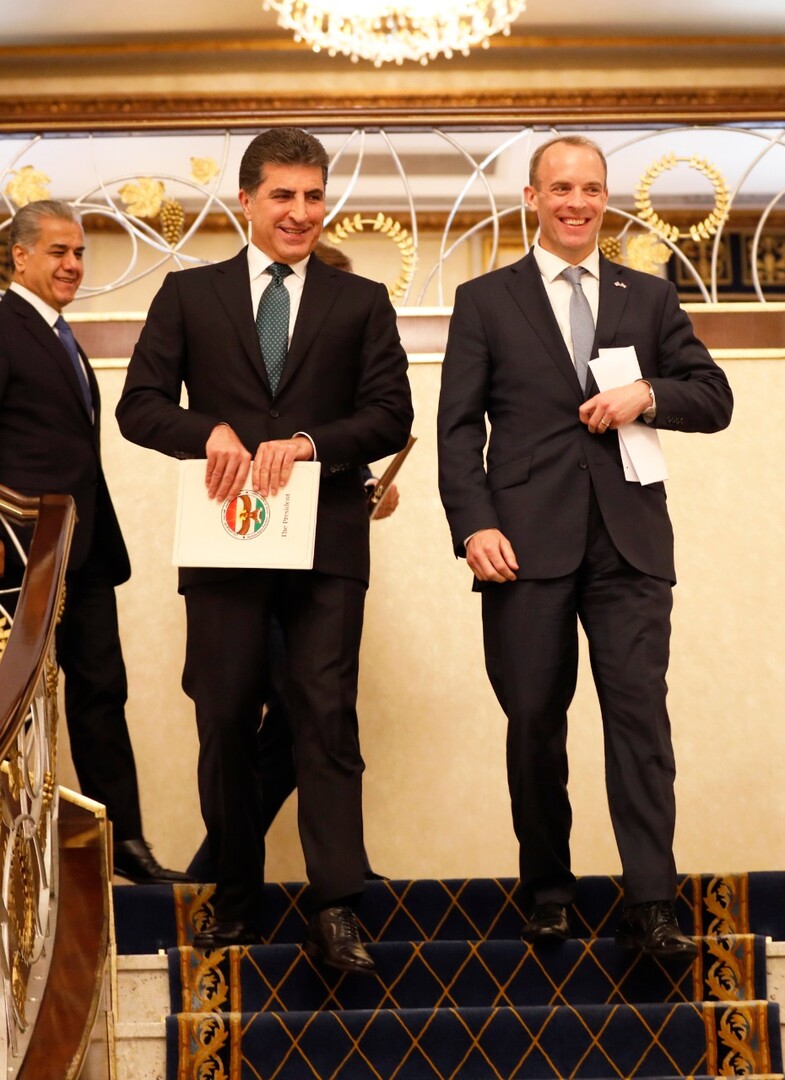
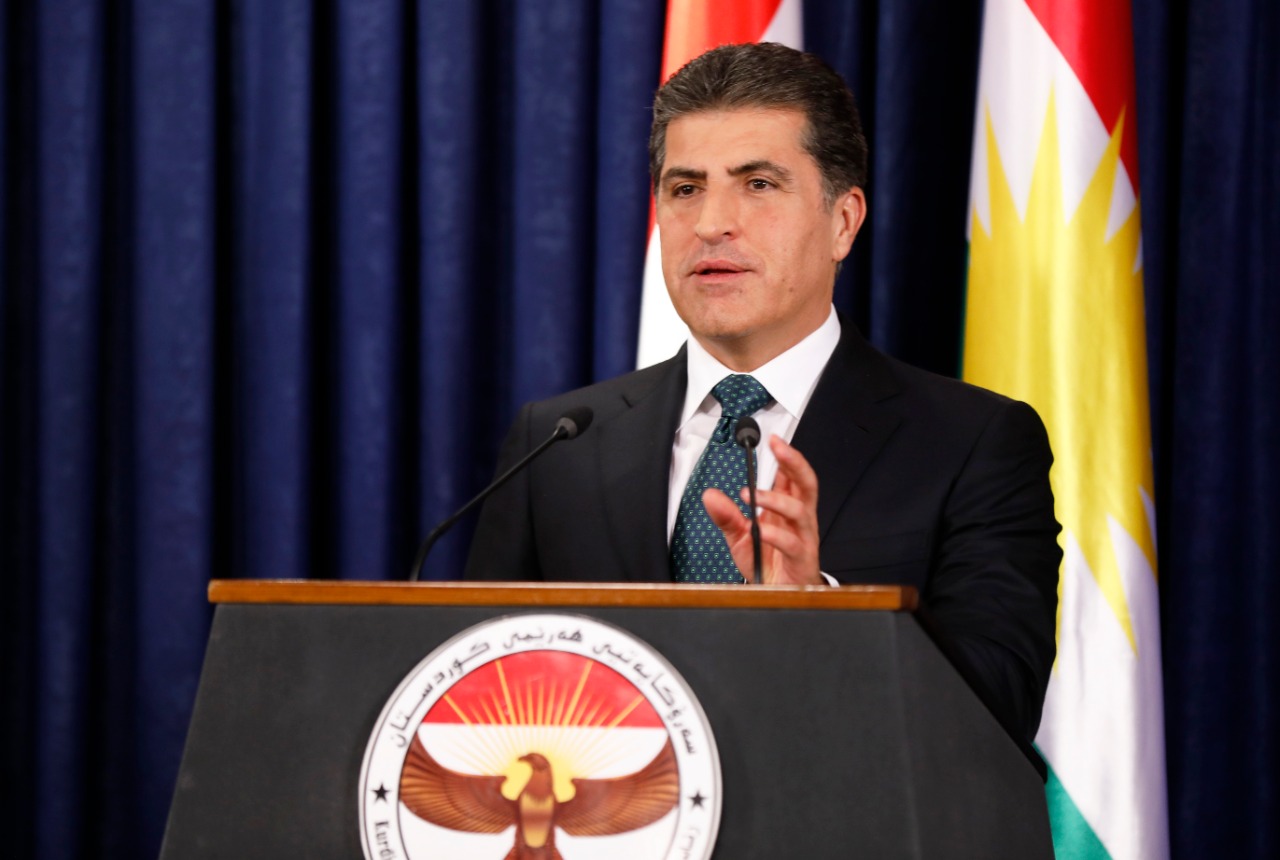
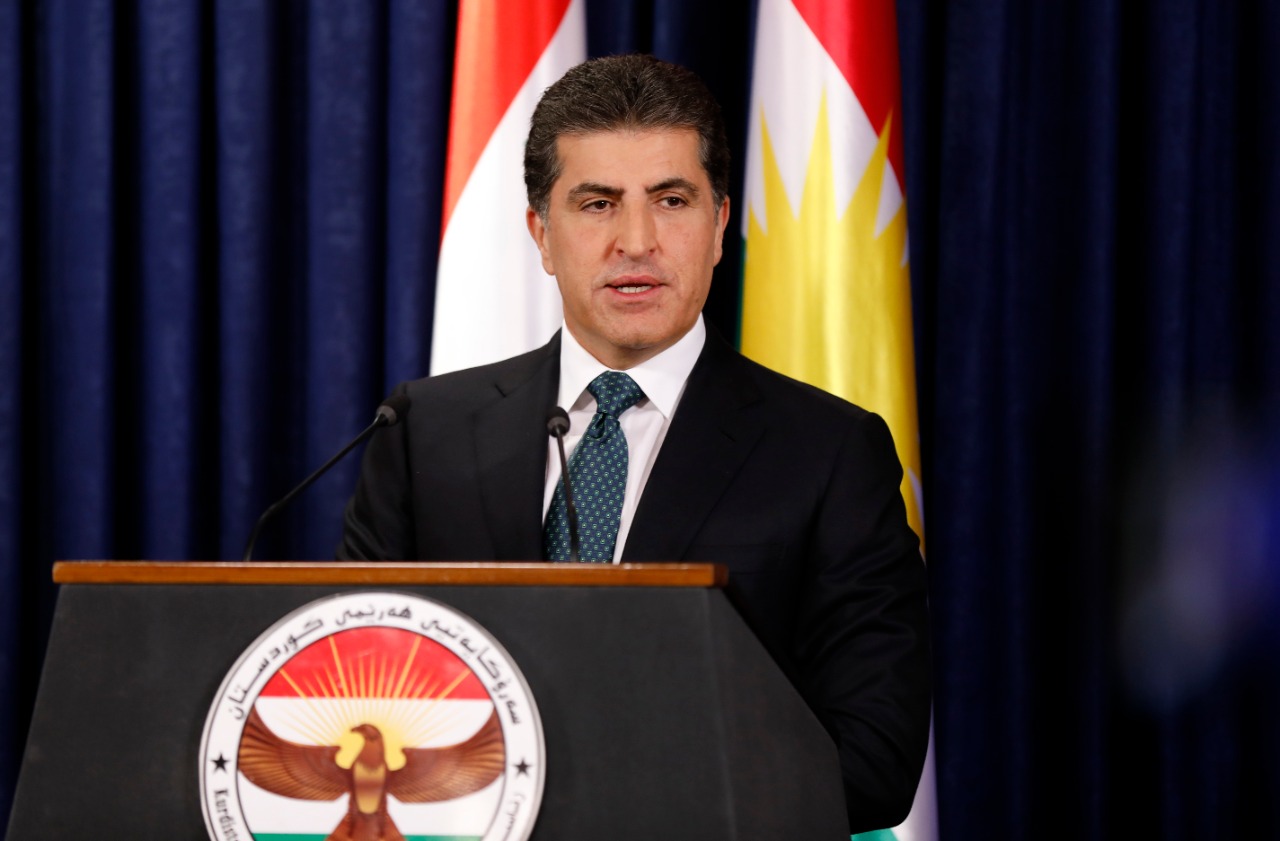
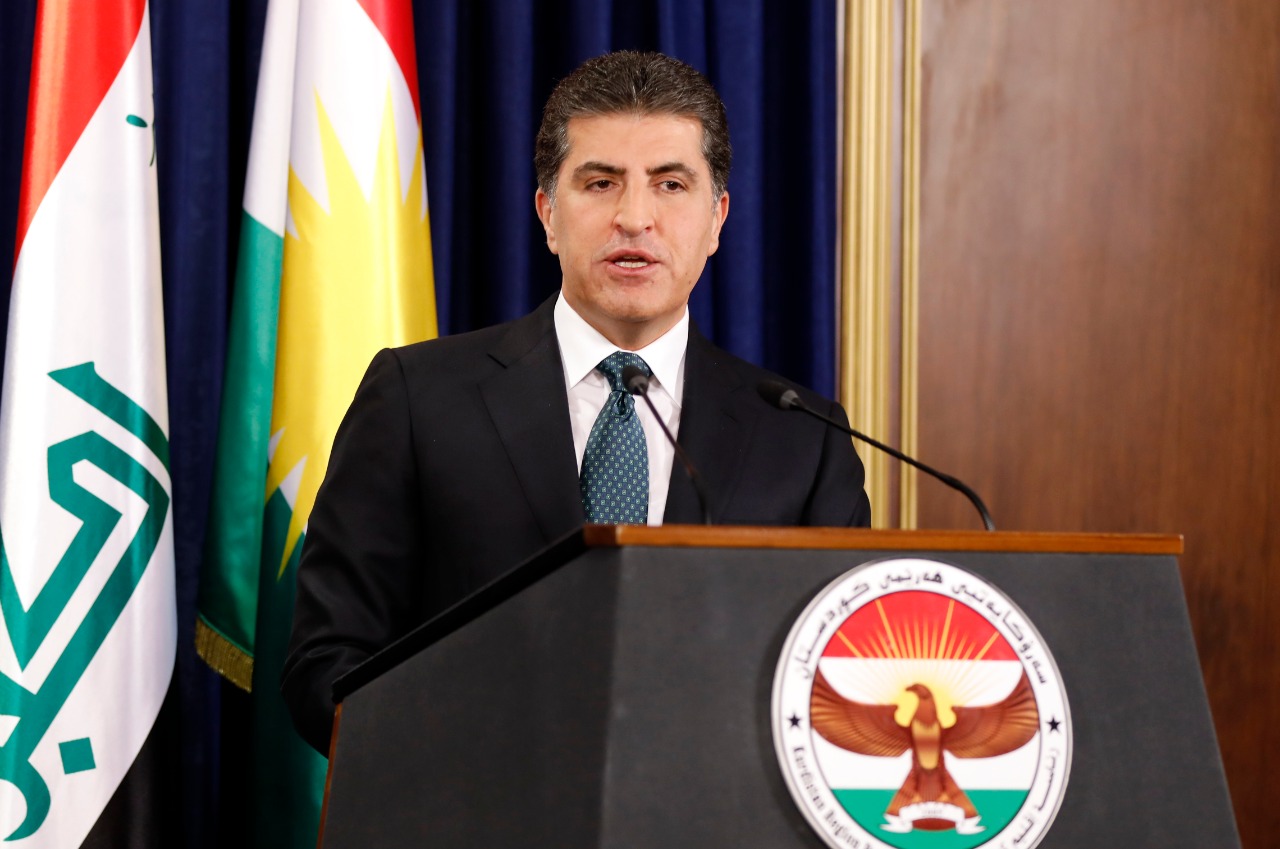
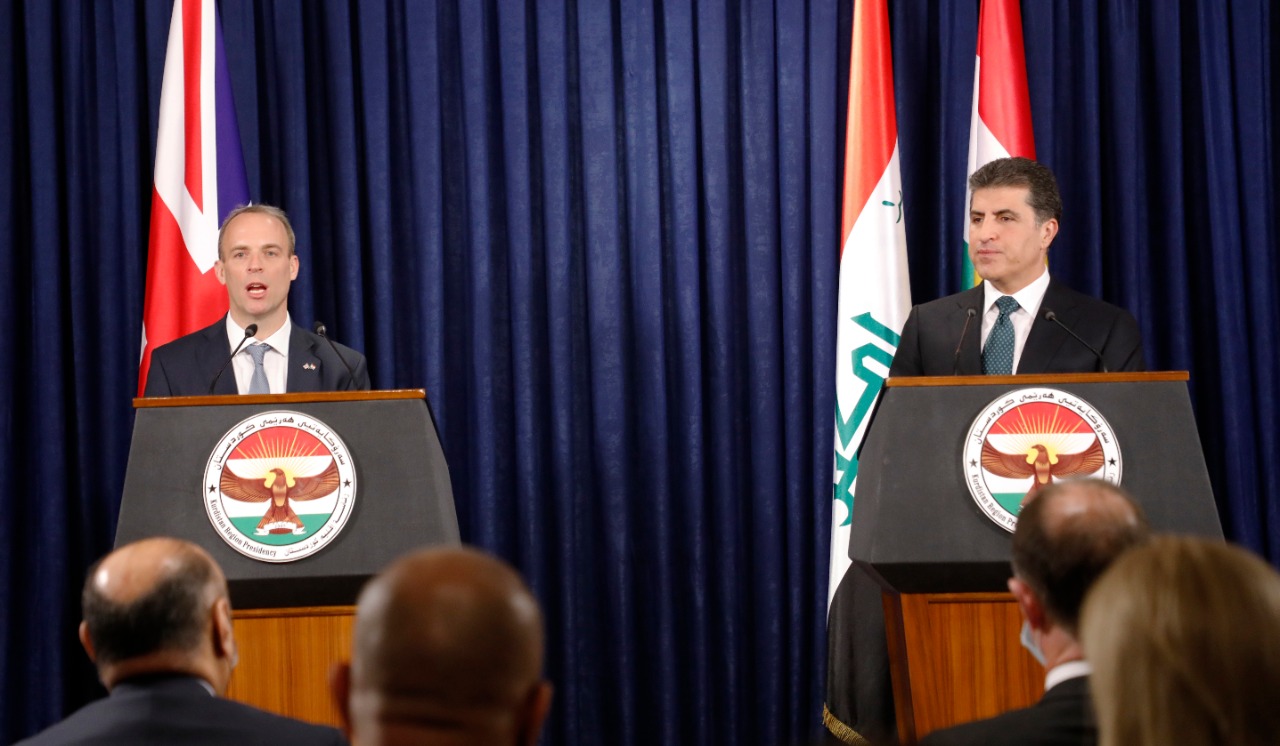
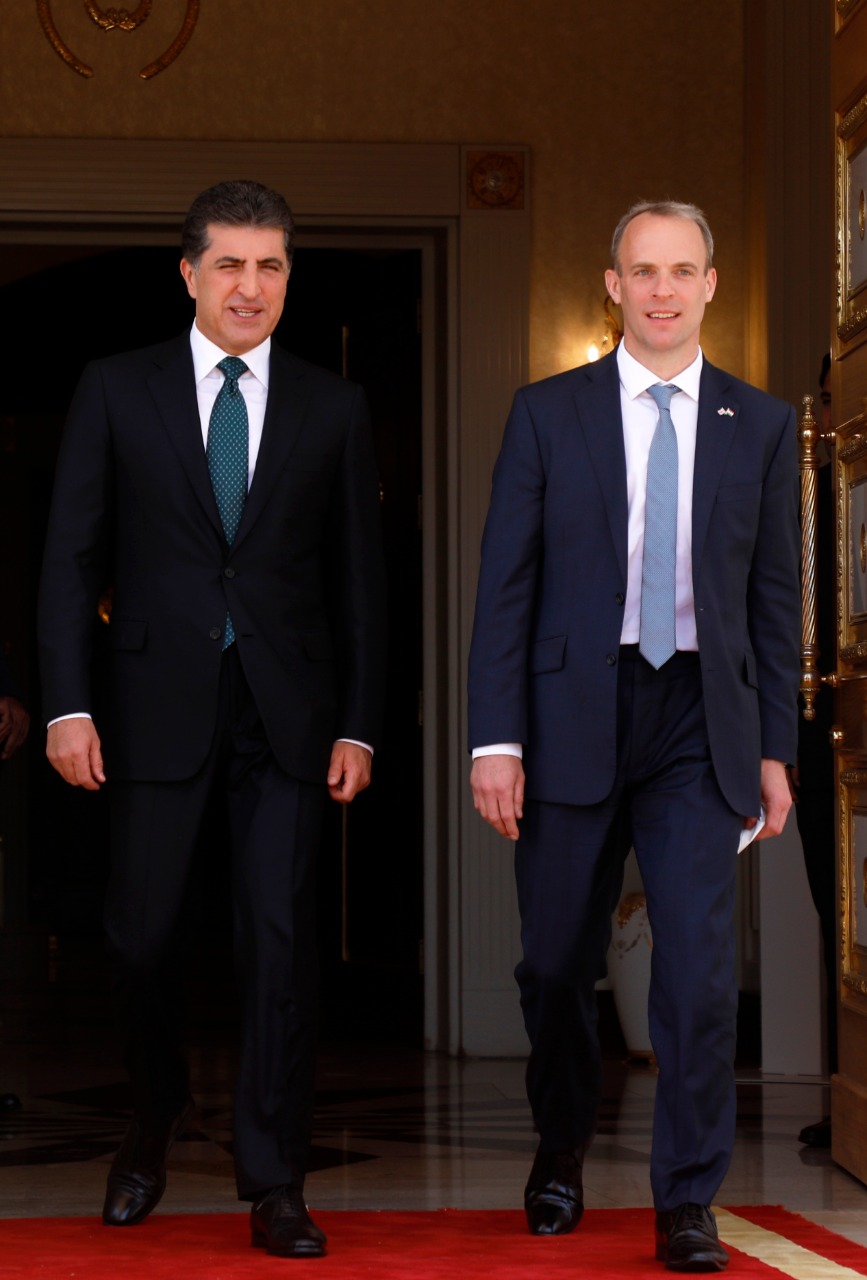
Kurdistan Region President Nechirvan Barzani received Mr. Dominic Raab, the United Kingdom’s Foreign Secretary and his accompanying delegation, in Erbil on Wednesday.
At the meeting, attended by the Kurdistan Region Vice Presidents, Kurdistan Region Deputy Prime Minister, the UK Ambassador to Iraq and the UK Consul General in Erbil, the strengthening of Iraq and the Kurdistan Region’s relations with the United Kingdom, job and investment opportunities for UK businesses in the Kurdistan Region, the reform process and the unification efforts at the Ministry of Peshmerga with the support from the United Kingdom were highlighted.
Discussions also covered the dangers of terrorism, especially the resurgence of ISIS, Iraq’s upcoming elections, Baghdad-Erbil relations, and the latest developments in Iraq and the greater region, and other topics of mutual interest.
Foreign Secretary Raab reaffirmed that the United Kingdom attaches great importance to its relations with the Kurdistan Region and is willing to further strengthen mutual relations, partnership and cooperation between the two sides. The Foreign Secretary officially invited President Nechirvan Barzani to the United Kingdom.
The President reiterated the importance of the continuation and expansion of areas of mutual partnership and cooperation between the two sides and referred to the historic relations between the Kurdistan Region and the United Kingdom. The President expressed his gratitude for the UK’s longstanding friendship and support to the Kurdistan Region.
Following the meeting, the President and the Foreign Secretary held a press conference on the content of their meeting. President Nechirvan Barzani started the press conference:
“Welcome all,
We welcome His Excellency the United Kingdom’s Foreign Secretary and his accompanying delegation, and we are delighted to welcome them to Kurdistan at this time within the framework of their visit to Iraq. In our meeting, we discussed a set of issues, including: the development of relations between the Kurdistan Region and Iraq with the Great Britain, the disputes between Erbil and Baghdad and efforts to resolve them, the war against terrorism, the dangers of the resurgence of ISIS, the upcoming Iraqi elections, the situation in the region in general and other issues of mutual interest.
“We value our relations with Great Britain highly, and we thank the UK for their continuing support to the people of Kurdistan. The partnership of the people of Kurdistan with Britain began 30 years ago in the mountains of Kurdistan. In April 1991, Britain worked with other countries in the United Nations Security Council to pass the Resolution 688, as Britain, along with our other partners, had a major role in mobilizing international support to establish the safe haven and the no-fly zone.
“The Resolution 688 and the process of providing a safe haven were the starting point for a new beginning for the Kurdistan Region, so that it could develop friendly relations at the international level. Since then, our relations with Britain have continued at various stages, and during the ISIS war, our partnership and cooperation expanded.
“We thank Britain and other members of the Global Coalition against ISIS for their continued assistance and support to Iraq and the Kurdistan Region. Together with Britain and the rest of the coalition, we affirm our commitment to continue to fight terrorism and the dangers and threats of ISIS.
“Like all countries around the world, the Kurdistan Region and Iraq have suffered great damage due to the Covid-19 pandemic and its repercussions. The economic recovery in the world in the post-Corona era needs planning, cooperation, partnership and multifaceted action.
“We are pleased that the G7 countries have allocated $15 billion to support women's development in developing countries, and we hope that Iraq and Kurdistan will benefit from this program. Especially in the fields of education, work, commercial projects, securing continuous income and solving the problems that resulted from the negative impacts of the Corona outbreak.
“The United Nations studies indicate that Iraq is one of the five countries most affected by climate change, and the beginnings of these detrimental effects have appeared in the Kurdistan Region, as drought is almost turning into a serious problem facing the Kurdistan Region. In addition to this, the negative impacts of the war against terrorism in Iraq and the Kurdistan Region had a harmful effect on the environment.
“We in the Kurdistan Region are committed to international measures to adapt, and mitigate the negative effects of climate change in the world. Within the framework of the limited capabilities of the Kurdistan Region, we have taken some small steps to formulate an ongoing plan to reduce the spread of CO2 and other gases that cause global warming. We are trying to apply practical measures in this area. We in Iraq and the Kurdistan Region need international assistance in this context.
“My heartfelt thanks to the British Ambassadors in Baghdad and the Consul General in Erbil for their efforts to strengthen our relations, we appreciate their efforts and wish them success.
“On behalf of the Kurdistan Regional Government and the people of Kurdistan, I welcome His Excellency the Minister. You are welcome.
Thank you.”
Later, Foreign Secretary Raab addressed the press conference.
“Mr. President, it’s an enormous pleasure to be with you today. Thank you for your warm welcome and the generosity of your hospitality. And I think it’s fair to say that my visit here reflects the importance that the United Kingdom attaches to this historic friendship. Let me say on a personal level, we are very proud to be long-standing friends of the Kurdistan Region of Iraq. The way you described, it’s now been over 30 years since the creation of the No Fly Zone on initiative of Prime Minister Sir John Major. I know there’s a road named after him, I’m gonna go take a selfie there at some point. And of course that was so vital to protect this region from Saddam Hussein and the violence that he inflicted on the people. I think it’s fair to say you have come an enormous long way since then. It’s been a challenging journey but you have come a long way. And the KRI has become, I would say, an enduring beacon of stability, resisting Iran’s destabilizing influence and you have been absolutely fundamental in the battle against Daesh. And we value that greatly and pay tribute to your efforts. And I think we have to pay tribute to the sacrifice of the Kurdish people, because there’ve been many of the victims along this historic journey.
“I had an excellent discussion with the President on a whole wide range of issues. We have shared interest, we have shared values. We got a joint stake in the stability of not only Iraq but the region. And UK is very committed to deepening that partnership on trade on business investments in all the areas that the President described.
“I think it’s positive that the Peshmerga reform con go forward, working with the Iraqi security forces and that can help remove Daesh from the disputed territories. I’m pleased that the UK provide new funding to train the Peshmerga on Cultural Property Protection, in line with the Haag Convention. And of course this in addition to the support that we are already providing.
“The President and I also discussed a whole range of other issues we attach importance to, the freedoms, security and guarantees for the people of the KRI, in particular things like media freedom, freedom of expression. I welcome the government’s focus on these things. I also welcome the KRI’s tolerant approach to people of all faiths and its support for displaced people. That’s enormously important. So, it’s partnership for the long term.
“The President’s touched on some of the international issues which are important for the UK and our G7 presidency. We touched upon the interests of the President and the KRI, he talked about girls education and climate change. We’re hosting the global partnership of education in July with our Kenyan friends, promote girls education globally. And of course he’s right about the importance of the issue in the KRI and Iraq generally. Climate change is another area for international cooperation. We’re hosting COP 26 in November. So it’s important to discuss the initiatives that are taking place here. And of course we can discuss all of these things more when the President visits the UK later on this year. So we look forward to see you in London and to strengthening even further this friendship between our government and even more importantly between our people.
Thank you very much.






















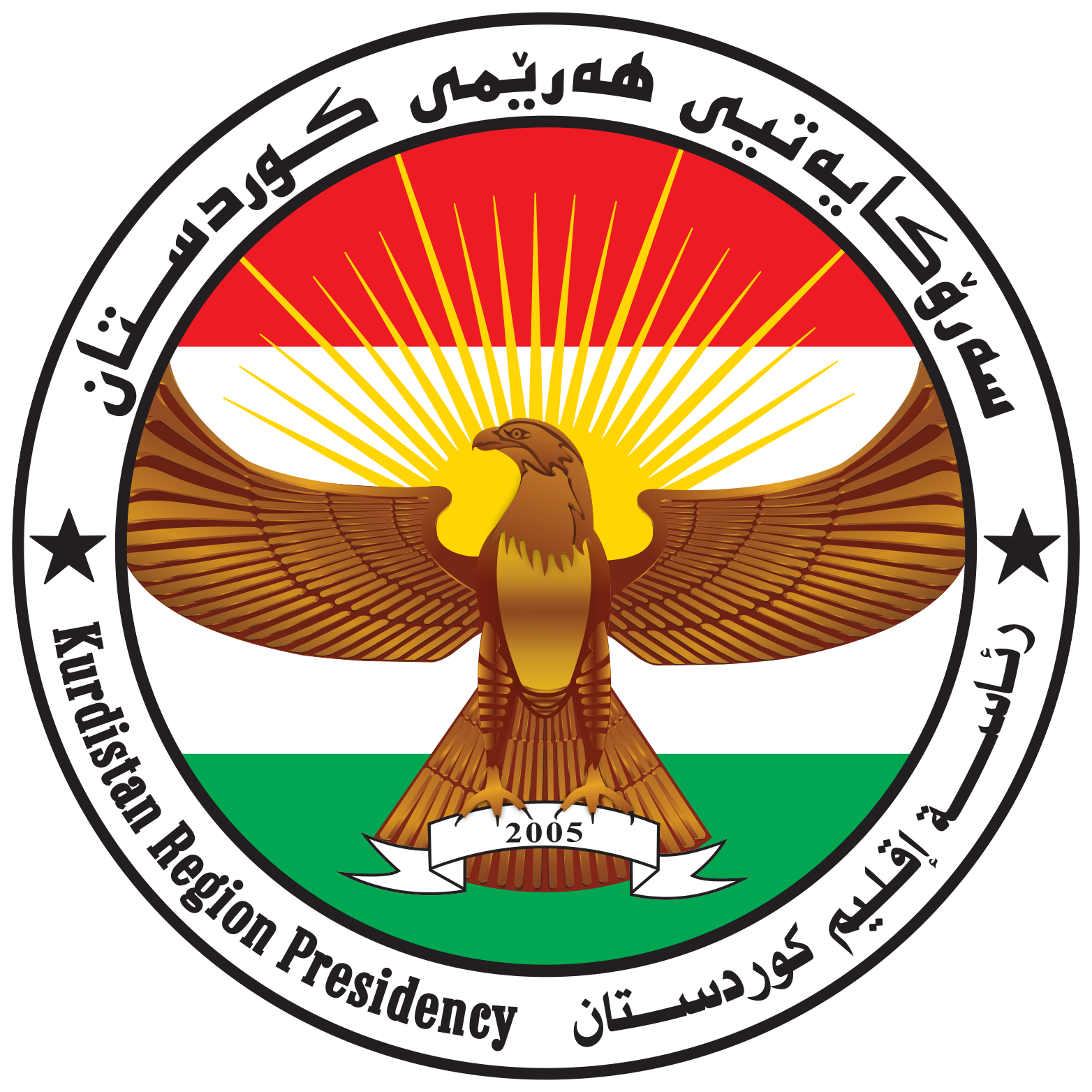

 پەرلەمانی کوردستان
پەرلەمانی کوردستان
